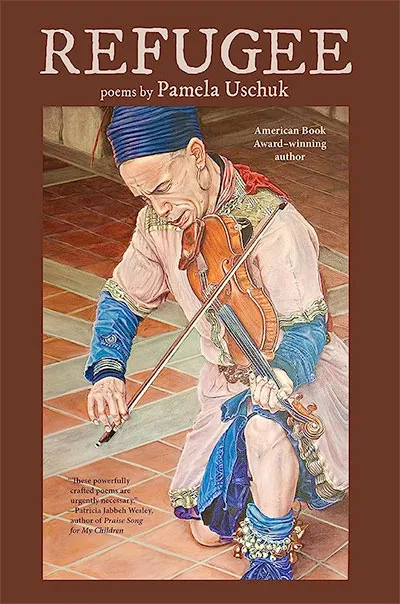
This was reviewed by Michael Hettich in Terrain.org.
Refugee: Poems by Pamela Uschuk
Red Hen Press | 2022 | 104 pages
In this time of acrimony and push-button polemics, it is a rare pleasure to discover a writer whose politically engaged poetry is vividly alive to the nuances evoked by incisive imagery and evocative form, a writer whose work explores both the rhetoric of argument and the intimacies of psychic and emotional revelation—the domain of true poetry—to bring us news from the real world, “where the mountains are burning and we cannot sleep.” Pamela Uschuk’s Refugee is just such a book, brimming with poems that powerfully communicate the ache—and the grace—of true witness, poems that linger in the heart as well as the mind.
As its title would suggest, Uschuk’s book is structured around the theme of refugees—political refugees, refugees from environmental destruction and from disease—refugees, in short, from all manner of violence and disregard. Within this larger, unifying thematic context, Uschuk has crafted her book in sections juxtaposing the outward-looking “political” poems with the intimate, inward-looking, almost private poems dealing with her own struggles with cancer and with the loss of her brother, among other subjects. These poems gain power by their placement next to the political pieces, just as the political poems gain power next to the more intimate. Occasionally Uschuk fuses the two modes in a single piece, creating a poem whose beauty and insight move us with the prick of authentic revelation. Here, in full, is “Finding a Moth Dead on the Windowsill,” a poem dedicated to the memory of her brother:
Astonishing this cecropia, the color of juniper bark,
its thin wings thrust back as if it dove through the stars
just to die here. What broke its flight
while night froze around its intent? I wait a breath
before I touch its final beauty, wonder
if my brother’s broad chest thrust up
to expel the moth wing of his last breath
in the veteran’s hospice, where Agent Orange
could no longer scar his hands, where
napalm could not scald the scalps of children
he watched incinerating all his life, so that
orphanages called him in dreams, so that he
could not bear the slap of moth wings on his porch
beating insistent as the blades of the helicopter
he shared with body bags going home.
If one sure test of thematic and emotional sincerity in poetry lies in the extent to which craft dexterity and formal skill have been employed as vehicles of discovery, the finely crafted poems in Refugee are convincing—and moving—in their sincerity. Uschuk refuses ironic detachment as she aches to connect deeply with both her subjects and her readers. She does this with precise artistry. Note the beautifully nuanced line breaks and subtle play of rhyme and consonant sounds in the following lines, from “Axis”:
Rain-slick in the lower pasture, two new foals
fall like wet garbage bags from their mothers, flatten
onto grass.
The mare bites through the birth sac, and
the colt shakes up on slayed knees,
breathes.
Before noon, the universe is his.
He gallops circles around his dam, neat
stallion hooves flicking skyward. Oh,
to be alive. Jive joyful. Migrating
vultures turn sky’s invisible axis
over his twin sister, who still cannot rise.
In other poems, Uschuk employs startling juxtapositions to convey insights and emotions that feel personal and universal at once:
A carpenter bee, big as my thumb, batters my window.
Behind him, the door is thrown wide to the sky.
I fetch a glass, trap his incessant buzz, cap it
with a health insurance bill, take him out
to fly over the thorns and prickly pear.
He has no need for thanks or to glance back.
Every six months I drive to the Mayo Clinic for a CAT scan
and blood tests. Routine never stops biting its nails on anxiety.
In the lab, I strip, wait in a thin gown with other survivors
to check whether our cancer has returned. I love them all…
(“Theories of Time”)
In addition to its human refugees, this book is inhabited by a menagerie of nonhuman refugees: elephants, manatees, elk, wolf, horse, butterfly, and all sorts of birds. Uschuk’s compassion for these nonhuman beings, wild and domestic, is manifest in many of her most striking poems, as in this passage from “The Morning Porch,” with its arresting opening images:
We stumble through an upsweeps hairdo of morning song—
grackles whoop and clatter like broken ceramics
frothed by runoff spinning through a culvert
while the golden nape of a woodpecker soft-strokes the live oak
on its rollercoaster flap to the waterfall.
Legions of white-winged doves ask their singular
who oh who who who
to the socked-in pantheist sky.
Despite—or perhaps because of—the suffering witnessed and documented in Refugees, Pamela Uschuk has fashioned a book of resilience, of hope—hope in darkness and hope in the tender and terrifying beauty so many of these poems reveal. Her book is also a call to action—in acts of kindness, compassion, and protest. But first, this poet tells us, we must resolve ourselves to the immediate task at hand, which is itself a kind of poetry:
I will not border on hysteria but will work
on a poem to feed all of us, a poem ground
from maize and jugs of fresh water to leave on the altar of need,
a poem with warm pillows and blankets to melt icy lies,
a poem to rock babies back to their mothers’ arms…
(“Bordering on Hysteria”)

